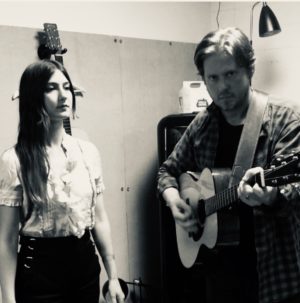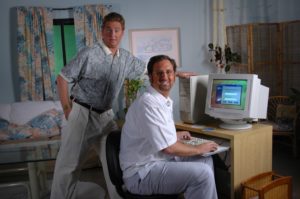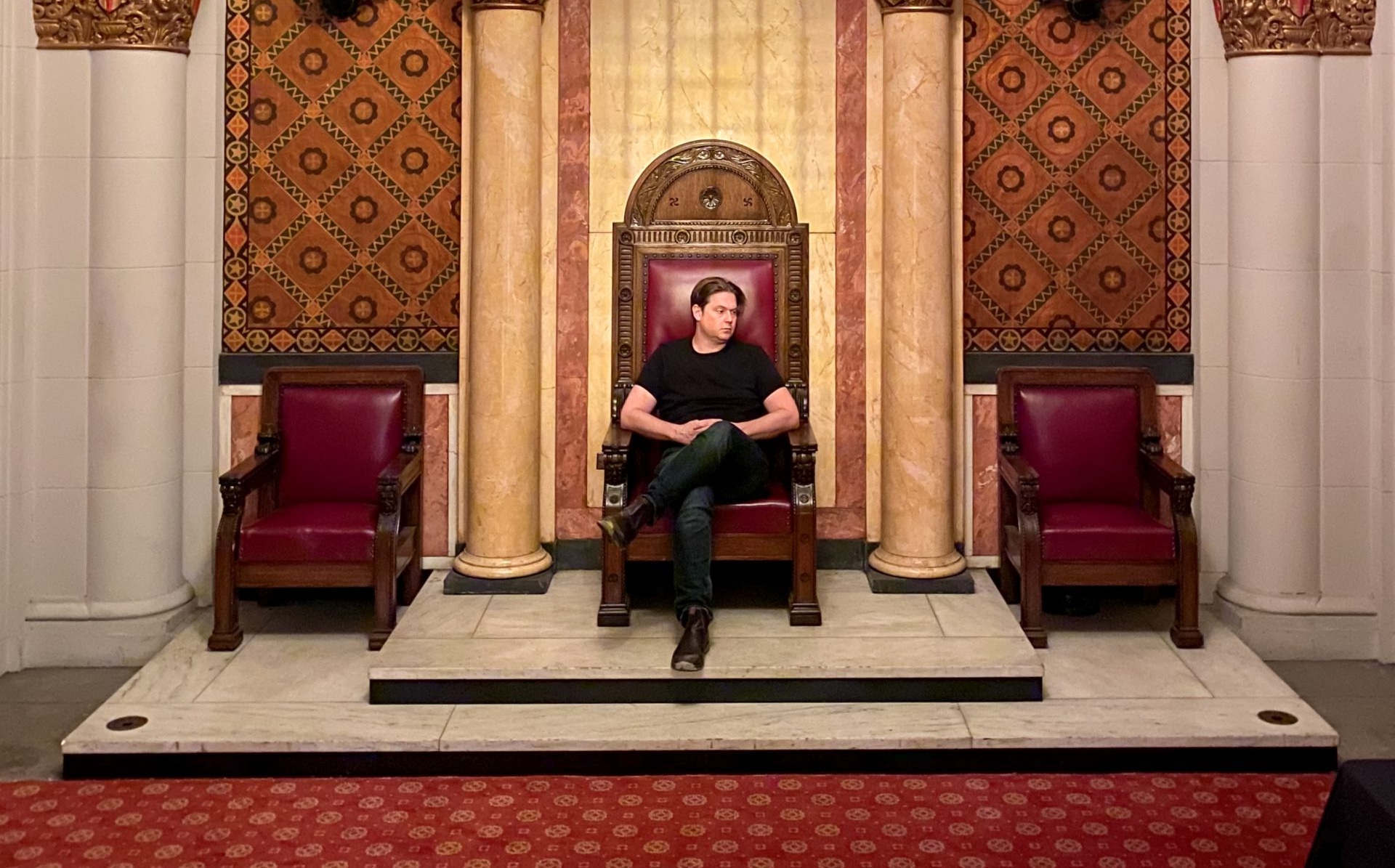Tim Heidecker begins his new album, Fear of Death, with an invitation. “Put your headphones on if you dare,” he sings, harmonizing with Natalie Mering (Weyes Blood) in major sixths. “You’re about to feel.” They sing the second line in unison, like Peter or Paul strumming his guitar next to Mary, leading a kindergarten singalong.
Those who’ve followed Heidecker’s comedic career but haven’t kept up with his musical one will hear this line as satire. “He must be kidding,” they’ll say, and maybe he is, a little. But Tim has been releasing earnest singer-songwriter tunes for half a decade now. At this point, it’s either the longest, least funny bit he’s ever done, or, as he’s indicated exhaustively in every interview he’s given since 2016, a sincere midlife pivot.
This interview does not reach a verdict on the case of whether Heidecker’s unabashed dad rock will appeal to the audience he’s accrued as a comedian, although it’s an incontrovertible fact that this album is his best so far, helped along by an impressive cast starring Mering, whose backup vocals dramatically enhance Tim’s raw tenor. Instead, we spent the short time allotted for our conversation discussing ’90s Philly hardcore, the Us premiere, and cavewomen.
I’ve seen videos floating around online of you playing in bands as a teen. Did you want to be a professional musician growing up?
Well, I’m glad I didn’t, because who knows where I’d be right now if I’d put all my eggs into one basket as an indie rock musician. All these things seem so far out of reach when you’re a kid. But bands are something you could actually do with friends. You could, with very little money, get an amp and some guitars. We would make home recordings on a rented TASCAM four-track. There was a little moment in high school where I thought, “OK, what would the next step be to take this more seriously?” I thought about making a demo, doing some more serious recording. But it fizzled out, and I focused more on film and acting. I really didn’t play music in college very much. It was really only when I started making TV that I went back to music, because we needed music for the shows.
What kind of bands were you in?
I had a band called Pulsating Libidos—the name was funny, but the songs were very ’90s folk rock. Bad comparisons, but Counting Crows maybe, or Gin Blossoms. It was pretty straightforward songs I’d written that were a little too serious. There was some funny stuff there too. We had some psychedelic vibes, I guess. But it was mostly just a fun way to hang with friends. We didn’t take it too seriously.
I saw a video once of you and Eric playing in sort of a new wavy college band. Is that real, or am I making that up?
Eric and some of our friends had kind of an emo, new wave–inspired band that I joined for a little bit to play keyboards. There were lots of Moogs and synth sounds going on. I dipped into that very briefly, but it didn’t last.
“I tend to like sad songs, songs that have a little lament in them, not joyful or celebratory party music. And I think that always intersects with pretty music. So when I’m writing, I guess my subconscious vomits out those feelings.”
Was that a more serious band than the ones you played in in high school?
Yeah, it was in that Philly emo/hardcore scene. We were playing shows in places like Khyber Pass. We did a little tour of the South over our holiday break. Those guys had been in that scene for years, playing in churches and basements and stuff.
On the three albums people consider your “serious” ones—In Glendale, What the Brokenhearted Do and the new one, you express some feelings of depression. I’m wondering if those are new, midlife feelings, or if they’ve always been with you, and if they’ve ever affected your ability to put out work at such a crazy clip.
Well, I’m lucky that I have an outlet for these feelings in the songs. I’m not in therapy or on any kind of medicine. I don’t think of myself as suffering from depression in a clinical sense. But I feel like I’m able to cathartically release some of these ideas in the music. I tend to like sad songs, songs that have a little lament in them, not joyful or celebratory party music. And I think that always intersects with pretty music. So when I’m writing, I guess my subconscious vomits out those feelings.
For this album, you got to work with Natalie Mering, who you’ve called a “generational singer-songwriter.” Were you ever intimidated singing alongside her?
Yeah, there were a few sessions where I was struggling to find the harmony, but she had patience with me. We tried to do all our harmonies live, with a few exceptions. But also, she helps me sing better. She makes my voice sound better and covers up some of my shaky moments.

What was y’all’s process? How involved was she in the songwriting?
I can’t stress enough the importance of Drew Erickson, our third partner in this. He was the instigator from the beginning. It was a really interesting time to work with Natalie, because Titanic Rising was coming out basically the first week we started working on this album. I’ve been through moments like that, so I knew this was a big deal for her, and also stressful, a lot of people needing her time. So I really wanted to make sure that this wasn’t interfering with that moment. But it was exciting, too, because that record is so great and people were receiving it well. I think it was nice for her because the pressure wasn’t on her to do this. She got to glide in and pipe in her thoughts and hang out with some fun people she knew. Drew was there to make sure the right people were there, and he’d written up lead sheets for everybody and arranged some things.
Natalie helped on a lot of the songs, especially “Nothing,” which we did very quickly. I’d written it after our first two sessions. I was so high off that experience that I was in my garage, like, “OK, I need to write more songs to do with these people.” I showed it to Natalie on the piano a few nights later, and she was like, “Why don’t you go here instead?” She changed, like, two chords, and it made a big difference. It was stuff like that, very instinctual, not over-analyzed. And she helped throughout the process, listening to mixes, talking about the cover.
On the whole album, you and Natalie very smoothly trade off the melody and harmony. Did you write the songs like that, or was it more spontaneous and collaborative?
It’s pretty spontaneous. You just sing it in the room with a piano or guitar and find it. I certainly don’t sit with a pen and paper and write sheet music. We had a couple things in mind: the album Desire by Bob Dylan, which has a lot of Emmylou Harris on it, and Graham Parsons’ work with Emmylou as well. I always think about Linda Ronstadt with Paul Simon on Graceland as an example, how they flow in and out of each other.
“[When] I was working on it, I thought, ‘I would love this album to close with a big zoom out, looking at this whole human story from a macro lens, something right on the line of being pretentious, almost uncomfortable, something that maybe only a woman could really sell, maybe only someone as good as Natalie.’”
One of the things you’re best at, in my opinion, is fully inhabiting characters. In your comedy, those characters are usually some version of Tim Heidecker. When you wrote “Oh How We Drift Away” for Natalie to sing alone, were you exercising that same muscle?
I think I do a little bit. We’d talked about having a track that Natalie took over. She said, “Oh, I’ve never just taken someone else’s lyrics and put them to music.” So it was sort of an exercise. But I wasn’t thinking about it as a Weyes Blood song when I wrote the lyrics. I was just writing about getting older and losing touch with the people you grew up with, and how some old friends try to keep it going. But when it becomes nothing but talking about the old days, I really lose interest.
And then I was working on it, and I thought, “I would love this album to close with a big zoom out, looking at this whole human story from a macro lens, something right on the line of being pretentious, almost uncomfortable, something that maybe only a woman could really sell, maybe only someone as good as Natalie.” That was just something I wanted to try to do, and I had this thought of cavewomen and their art, and the long arc of the human species. I was probably watching the History Channel thinking, “This would be a cool place to go in a song.”
My other two favorite tracks from the album are “Nothing,” which you mentioned already, and “Property.” I think they both have some of the nihilism that’s characteristic of your comedy, but it’s laid out in much more earnest, plainspoken terms. Was it cathartic to face those feelings head-on, rather than through ten levels of irony?
Yeah, I think “Nothing” is probably the most autobiographical song I’ve ever written, because it’s quite specific, especially the second verse, which is about the premiere of Us, and about checking in with where I was at, and how silly and weird it felt, and my general thoughts about the afterlife. You know, “What’s the point?” Again, that’s not something I dwell on all the time, but when I write music, it comes out.
The other song, “Property,” is a little more removed, thinking about some traditions we have as people and what instigates them to change, and how change is happening all around us all the time, and how we hang onto tradition for reasons we sometimes don’t remember anymore. So that one is a little more intellectual than personal. But I come from a family that’s like, “Don’t worry about burying me anywhere. Throw me in the ocean!” And that seems like a fairly new, human reaction to death.
I think a lot of the people who don’t get your music are people who, in some sense at least, do get your comedy, and are confounded by your turn toward sincerity. I think, in general, your music is a lot more intellectually accessible than your comedy. Would you agree with that?
I mean yeah, it’s more straightforward. I think the kind of music I make is probably not the kind of music a lot of my comedy fans listen to. There’s a whole generation of people that didn’t grow up on this kind of music. They think it’s lame because it’s the kind of music their dad likes. I also think there’s a whole group of people that would like this music but might have been turned off by my comedy and aren’t really interested in dipping in. So I’m in a weird position. Every record, I talk with whoever is putting it out about how we’re gonna get it to reach as many people as possible, as everybody tries to do. You always hope, “Maybe this record will be the one.”
I think it was very confusing and very disorienting for people when In Glendale came out. With each new album, it should be a little less surprising that that’s what I’m doing. But I’ll still find people in the comments being like, “I don’t get it. What’s the joke? Is this supposed to be funny?” You know, whatever. You can only do so much explaining.
“I’ll still find people in the comments being like, ‘I don’t get it. What’s the joke? Is this supposed to be funny?’ You know, whatever. You can only do so much explaining.”
There’s still nuance to your music, though. On “Nothing,” I think the saddest moment is on the verse you mentioned about the Us premiere, where you say, “I just said hello to the same guy twice.” It really hit me, how depression and thinking about death can make social interaction feel both meaningless and terrifying.
Hopefully it’s an experience we’ve all had at one time, feeling socially anxious or lost in the world. That’s not to say I didn’t have a great time at that premiere. But when you’re writing a song, it’s a little more interesting to talk about how those are uncomfortable moments. No one wants to hear a song from me about how great things are going. That’s not interesting to anyone, including myself.
Who do you hope this album connects to most, if not your core audience?
Well, I want it to connect my peers. It would be great if David Crosby thought it was a good record, or Paul Simon [laughs]. That would be cool if there was some recognition that I’m making that kind of music, that people who also make that kind of music identify my music as something worthwhile. That sounds a little arrogant. I guess it’s just for people who like this kind of music in general. I don’t need them to be fans of “Beaver Boys” or “Spagett.” I would be happy if it just connects to people who like pretty music.
I would be afraid to show my music to David Crosby. He’s kind of a dick online.
Yeah, that could come back and bite me.
Your alt-right ex-fans have been harassing you for a while now, but it’s escalated recently with the QAnon folks joining in because of the Will Ferrell child clown sketch, which would be hilarious if they weren’t threatening your family. I know that happened after Fear of Death was already in the can, but have the death threats and the horrible pedophelia accusations affected your thoughts on mortality at all?
It’s not too connected, but it’s been four or five years now of feeling a bit under attack by these people. I don’t worry as much for myself as for my family. If I was alone in the world, I’d be way more aggressive about it, way more combative than I already am. I’d be like, “Let’s fucking go, assholes.” But I do think about my kids and my wife and my life.

photo courtesy of Abso Lutely
On a lighter note, do you show your kids your work, or do you think they’re still too young for it?
They know this record very well. I’ve been playing them the mixes for a long time now. My daughter can sing much of the record. And they’ve seen some of the comedy stuff. They haven’t seen much Tim & Eric yet, but when I was making Decker, they were watching that a little bit. They have an awareness of what I do and are very supportive of it.
The second-to-last track on the album is mostly just a fun song. But then there’s the lyric, “It may sound like comical hyperbole, but we’re looking at imminent death.” That line feels like the clearest iteration of your whole ideology, that everything is ridiculous and darkly hilarious right now, but we’ve also never been closer to collective doom. Again, I know you wrote these songs pre-COVID, but how has the pandemic influenced your thoughts on all that?
I’ve had this happen a bunch recently in different projects, where it feels like I’ve got a little touch of premonition going on in me, or there’s just a bit of weirdness, a synchronicity with some of our ideas and what’s going on in the world. Maybe we’re just getting lucky, or unlucky. We’ve had this in the can for a year, but now people are gonna take it as being about this very specific moment. I don’t know, I think you just take those opportunities and don’t examine too closely how or why they happen. It’ll certainly sit differently with people than it would have last year. That’s the way it is. FL







